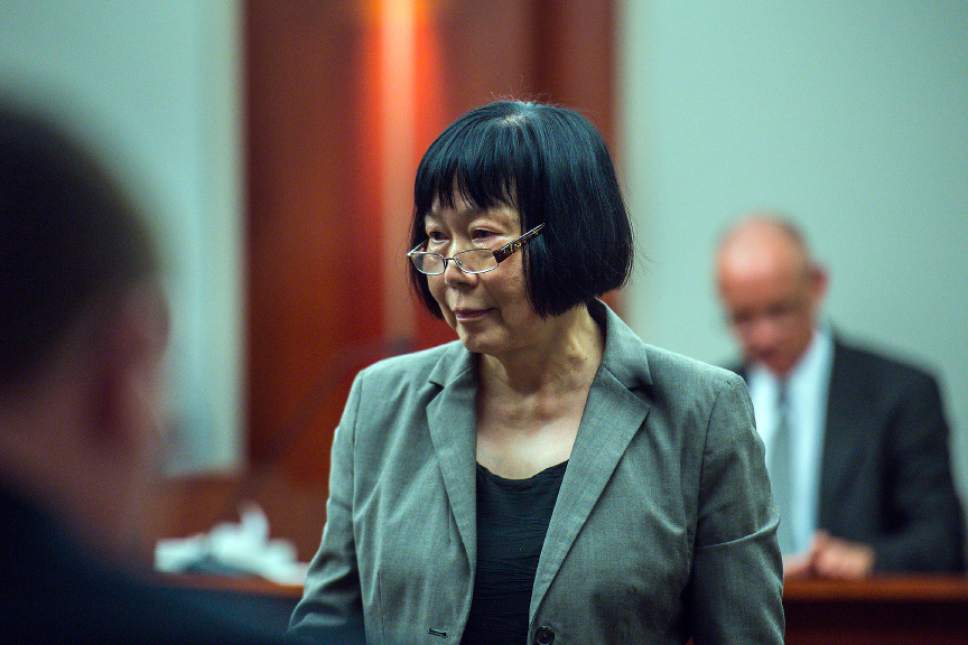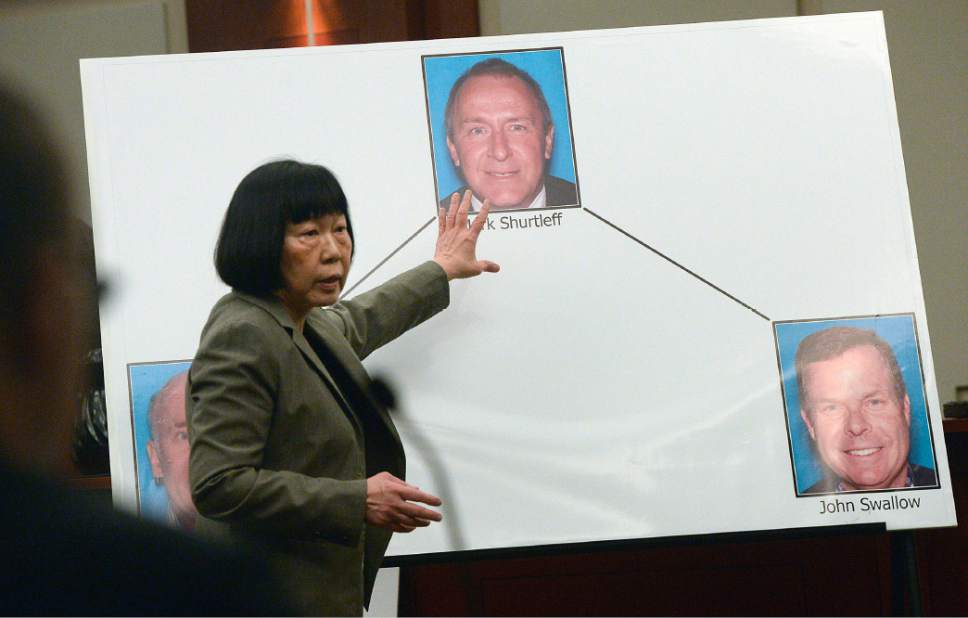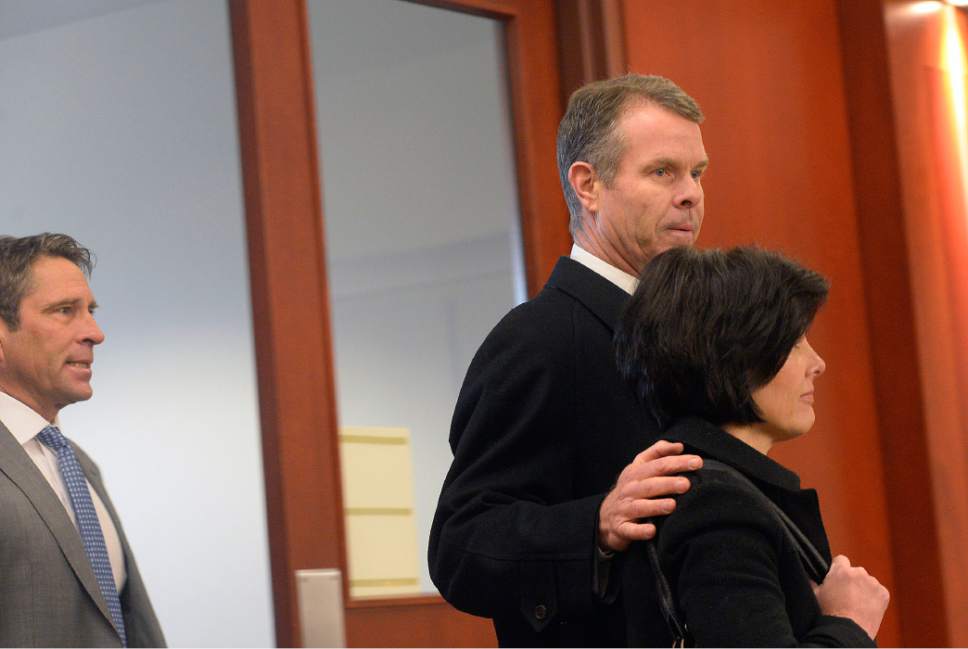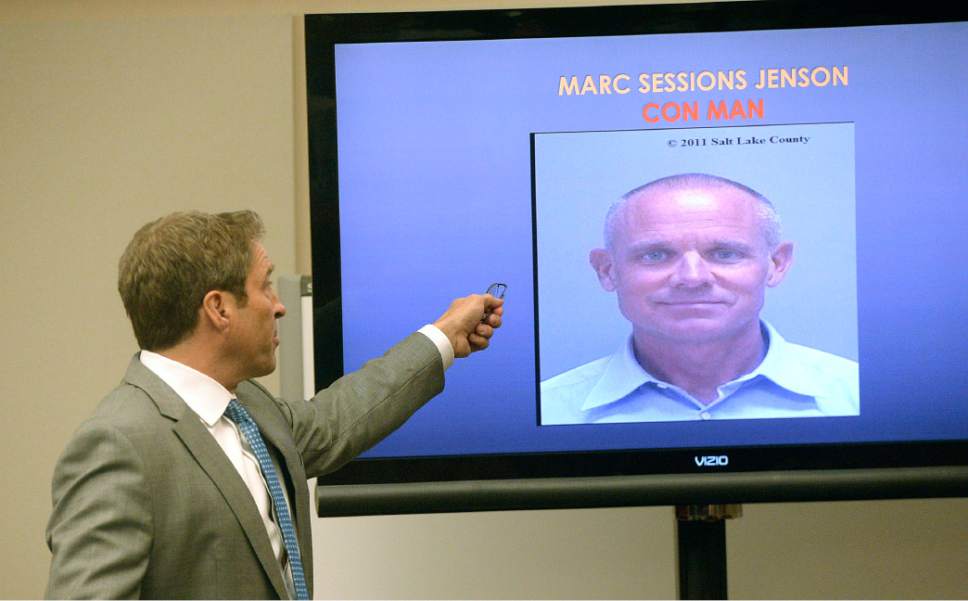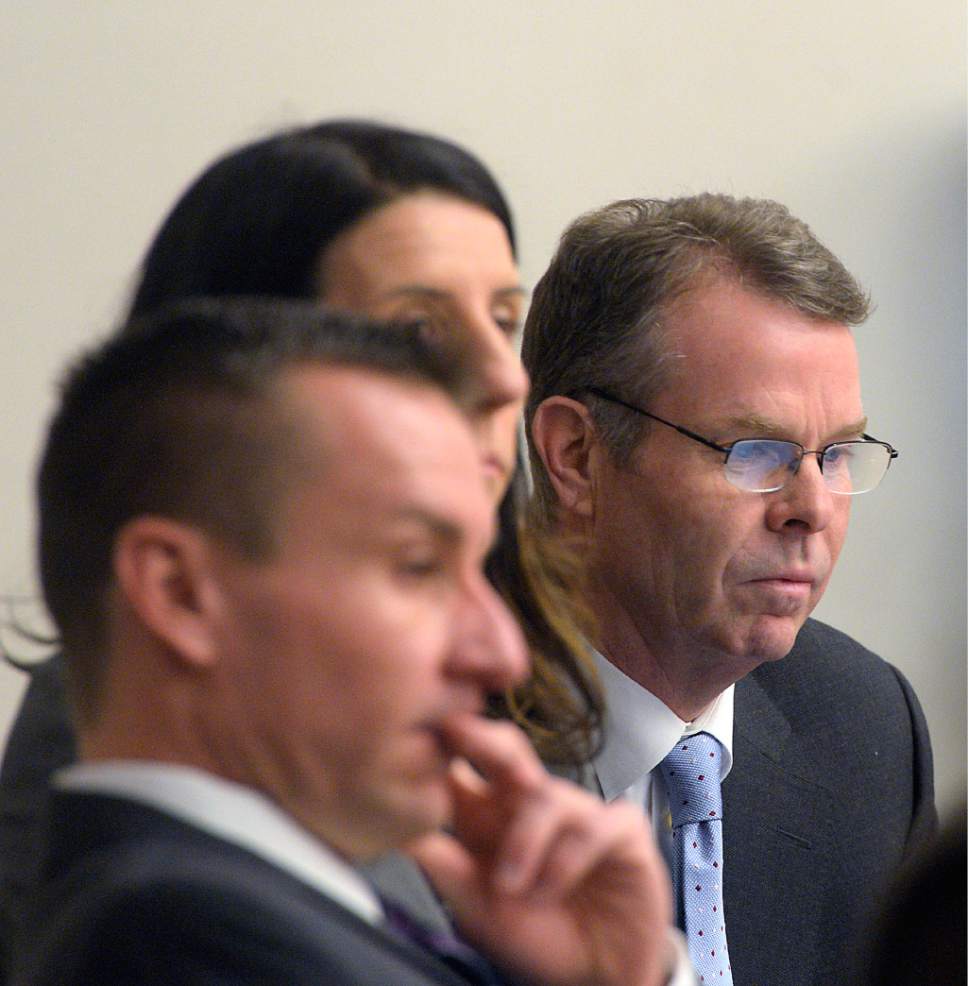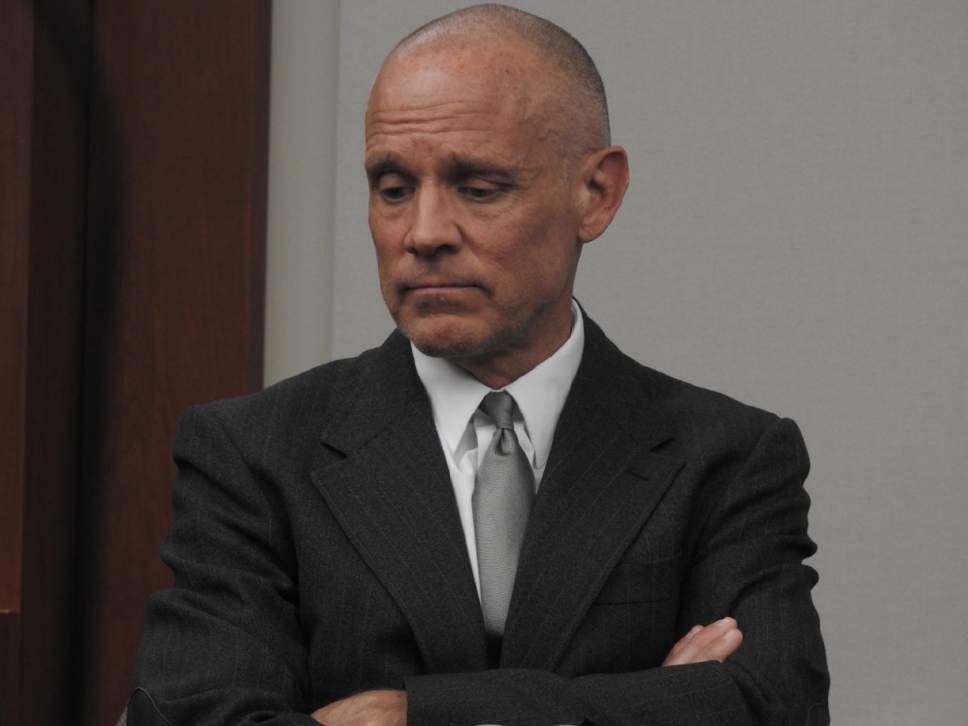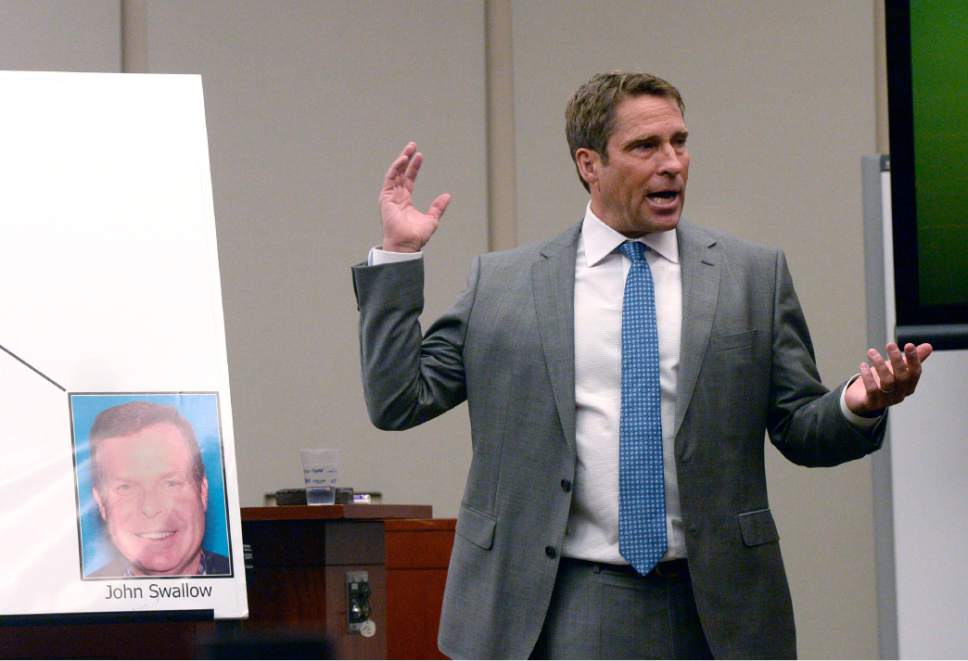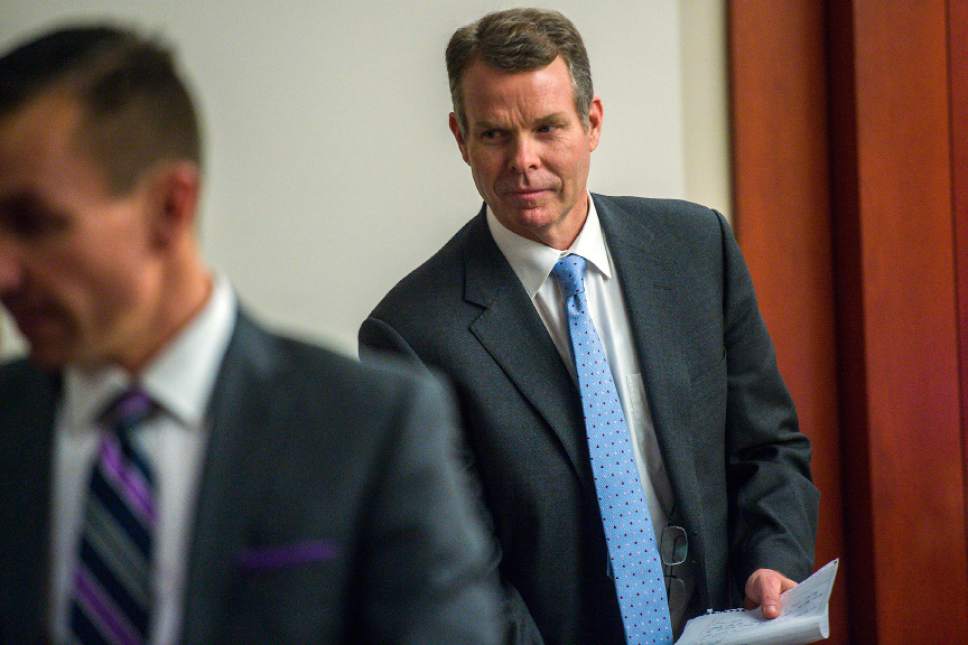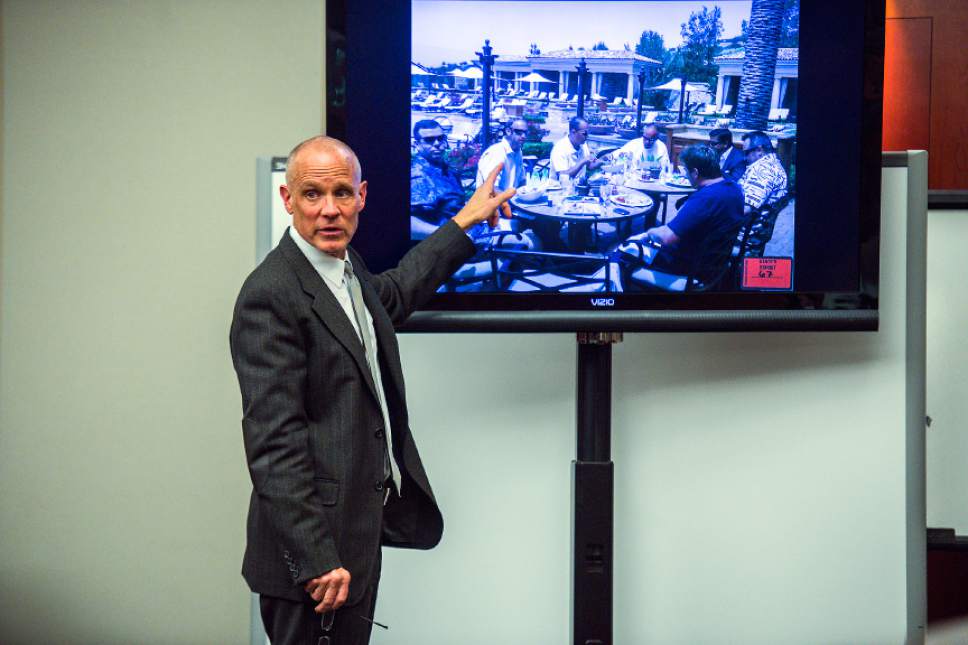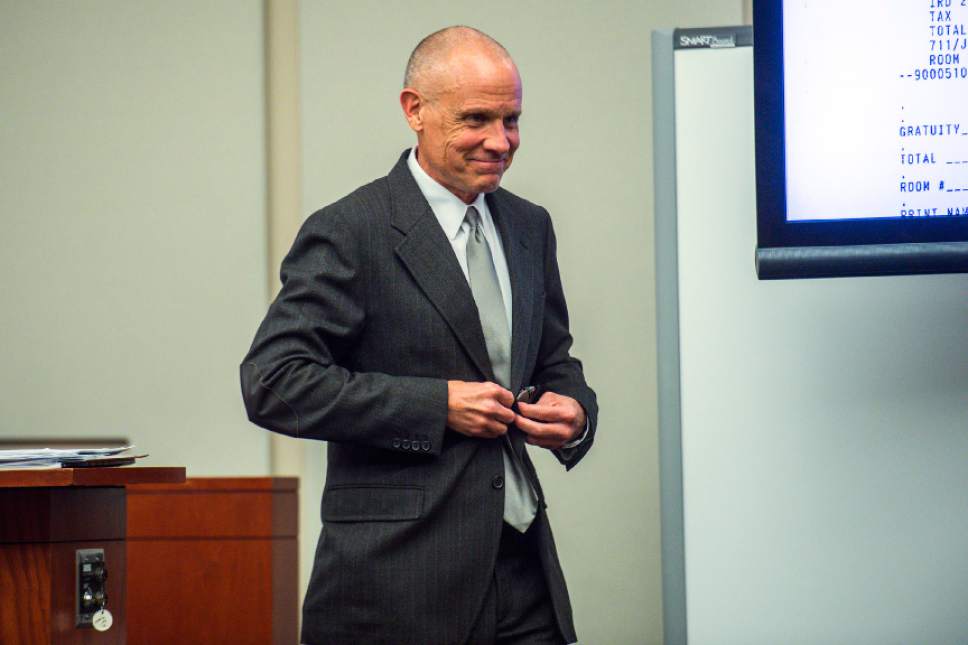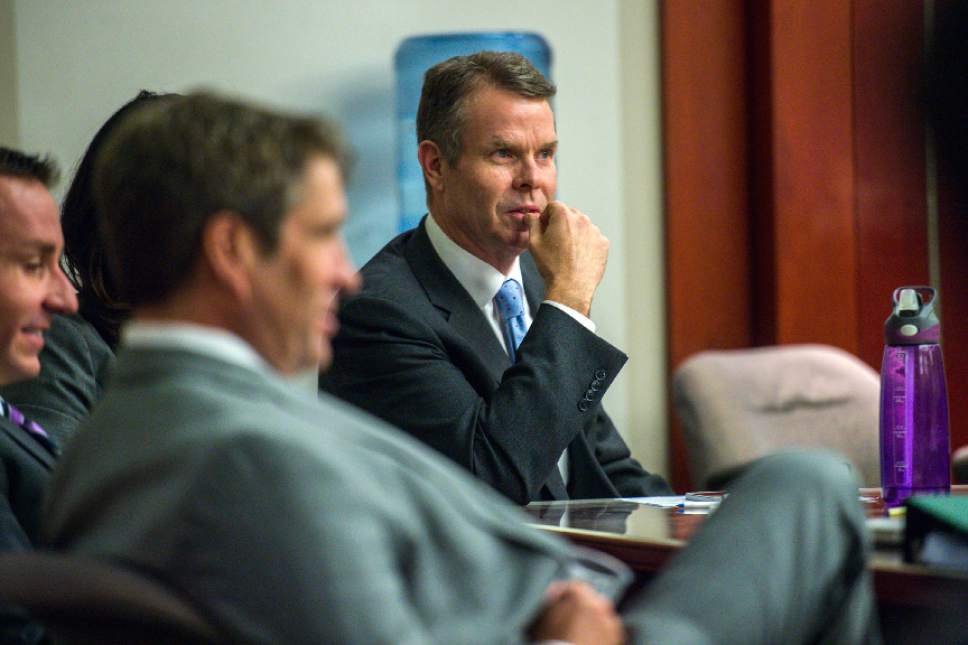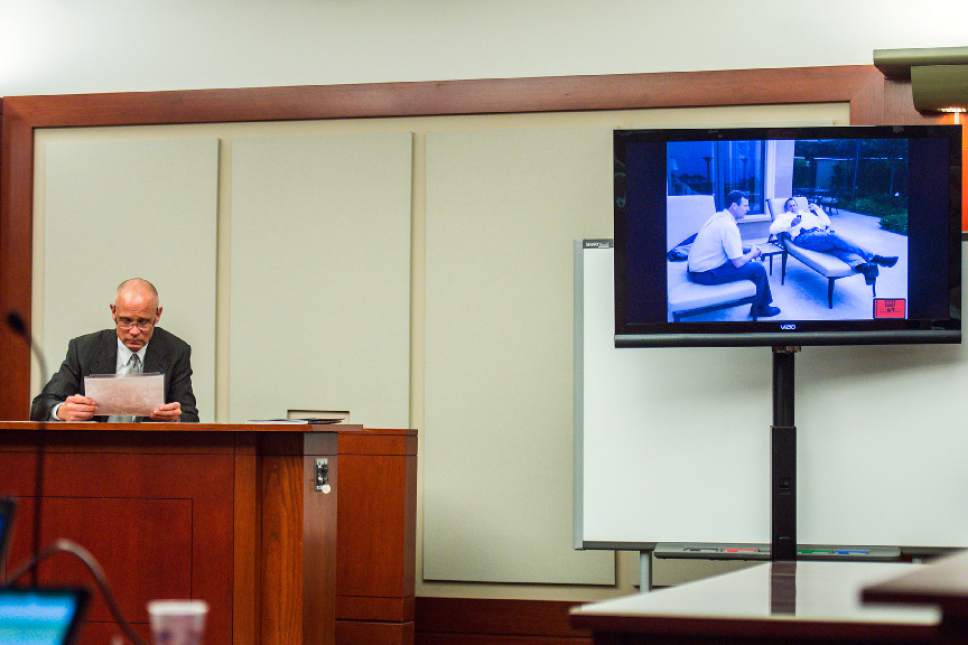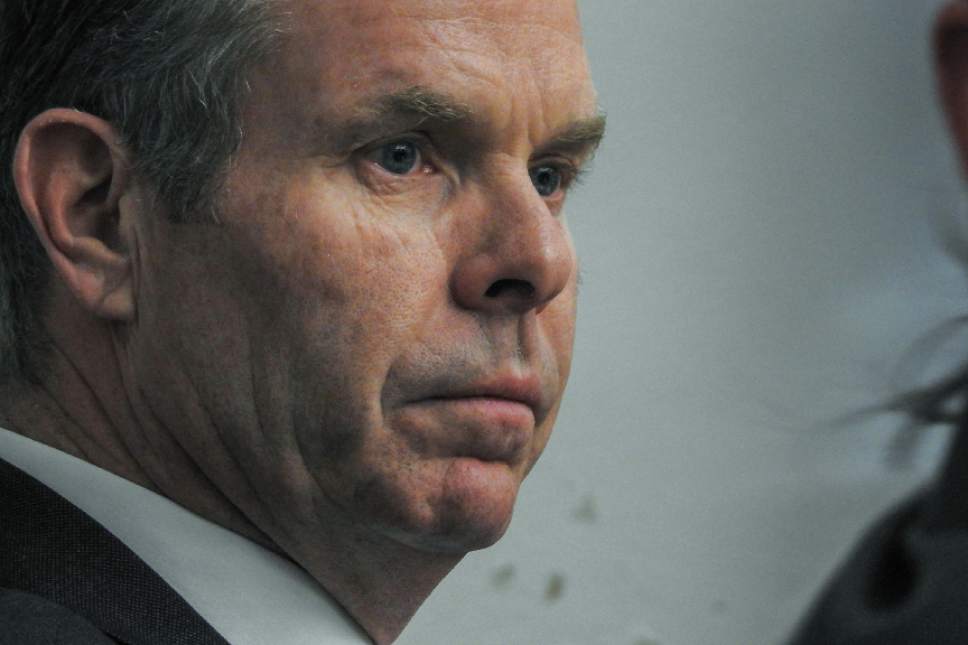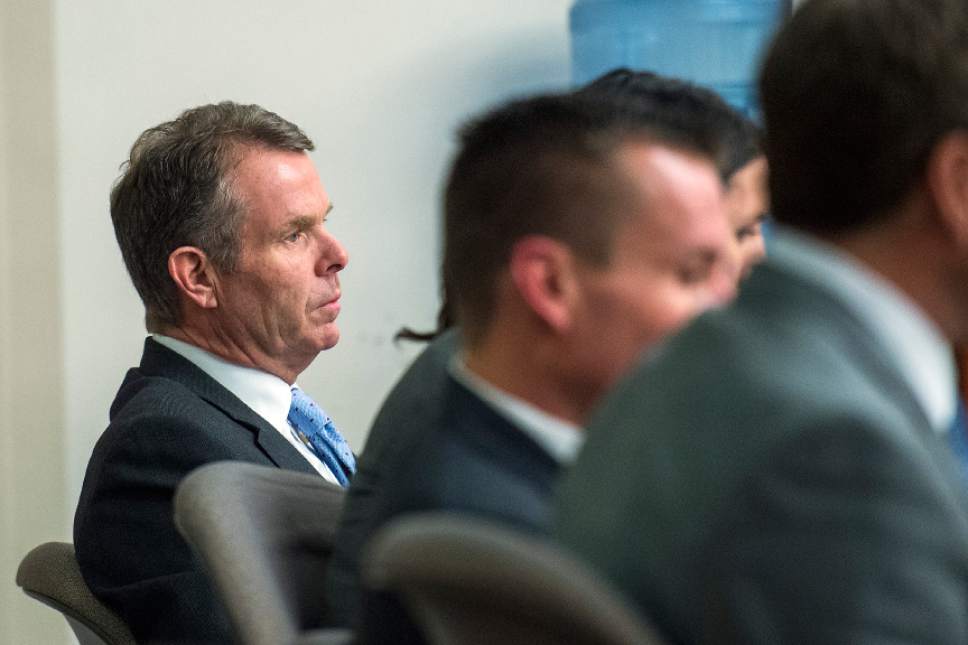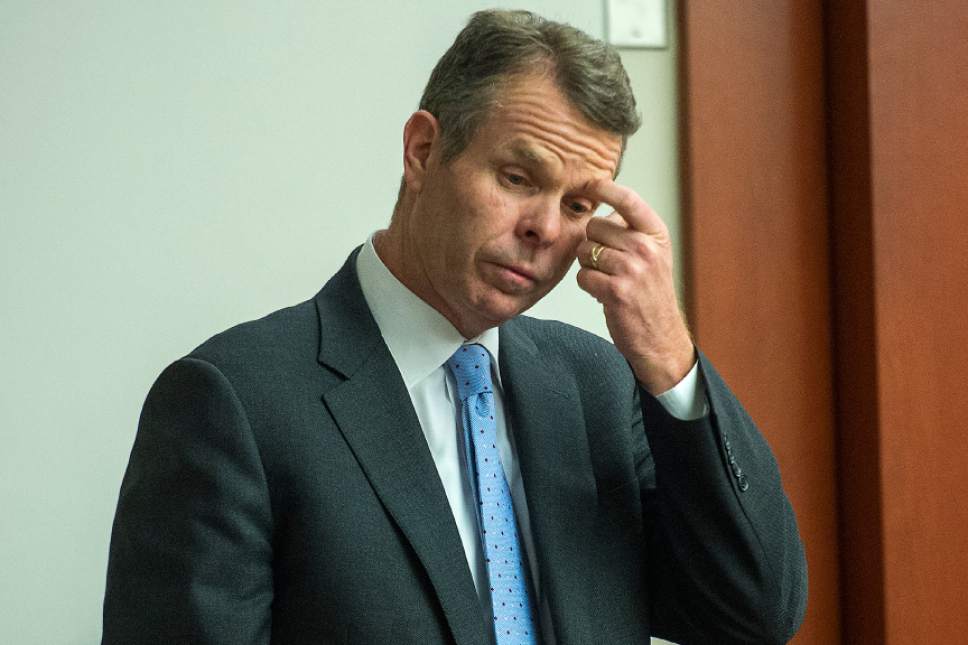This is an archived article that was published on sltrib.com in 2017, and information in the article may be outdated. It is provided only for personal research purposes and may not be reprinted.
The trial of embattled former Utah Attorney General John Swallow got off to a headline-grabbing start Wednesday with testimony from a key accuser.
After opening statements, once-imprisoned businessman Marc Sessions Jenson was the first witness. He was expected to testify about the 2009 trips Swallow and his immediate predecessor, three-term Attorney General Mark Shurtleff, made to a ritzy Southern California resort.
Jenson has alleged he was arm-twisted into footing the bill for both men, and then shaken down for cash and other favors.
The trips came while Jenson was on probation in a securities case filed against him when Shurtleff was attorney general. Swallow wasn't working for the office at the time, but was raising campaign funds for Shurtleff.
Swallow has pleaded not guilty to 13 felony and misdemeanor charges, stemming from allegations of erecting a pay-to-play climate inside the attorney general's office. If convicted, he could spend 30 years in prison.
The latest from Day 2 of the trial:
5 p.m.
Jenson said he had multiple requests to talk with law enforcement in 2013. He was in jail because he had not paid the $4.1 million in restitution.
He said he began providing Pelican Hill documents to the FBI and U.S. Department of Justice in 2013.
Jenson then began reading from Pelican Hill bills that came from the audit he had done of his account — information he that turned over to the FBI.
The total for Mark Shurtleff, John Swallow and Shurtleff's friend Tim Lawson to play golf was $1,200, Jenson said.
The next invoices are for $220 stone massages, one for Swallow and another for Lawson.
Another is for a $30.45 hat, which was billed to Jenson's villa, but about which he said: "I believe that's John Swallow's signature."
When the prosecutor asked Jenson why he kept paying, he said he was always threatened with prison if he didn't do as asked.
Jenson said the total bill for the May 2009 Pelican Hill stay was $6,000 or $7,000.
—
4 p.m.
Jenson said that after he resolved his criminal case, he continued to talk to — and pay — Tim Lawson. Payments were every few weeks.
Jenson said Lawson, in 2009, was the first of a number of Utahns to visit him at the Pelican Hill resort in Southern California, where the going rate was $3,000 per night.
Lawson wasn't invited, Jenson said, adding: "I acquiesced."
Lawson asserted he had attorney general's office business to do with Jenson, who paid for his trip.
Shurtleff and Swallow also came uninvited to Pelican Hill. Jenson said Lawson told him that if he did not host Shurtleff and Swallow, they would put him in prison.
Jenson said the Pelican Hill dinner conversations with Shurtleff and Swallow were often about "their expectations for me."
Those expectations included that Shurtleff told Jenson to pay businessman Mark Robbins, who had bought out Jenson's debt to businessman Mike Bodell. Jenson says he paid Robbins millions.
—
2:45 p.m.
Marc Sessions Jenson, who said he had been making payments of between $2,000 and $10,000 to Lawson every few weeks, testified that he was getting tired of paying Lawson and Swallow and just wanted his case resolved.
He said he visited Mark Shurtleff at a rehabilitation facility after Shurtleff's September 2007 motorcycle accident. Shurtleff offered the idea of a plea in abeyance, saying that, as a politician, he couldn't ask his staff to drop the criminal case.
An initial plea deal called for Jenson to pay $15,000 in restitution, but Jenson's victim's wanted $4 million and a judge rejected the deal.
Jenson said Swallow called him right after the plea deal fell apart and said, "Don't worry about this." Swallow said any agreement would be overseen by the attorney general's office, not the court, Jenson testified.
Jenson eventually entered a plea in abeyance that included $4.1 million in restitution.
After the plea, Jenson said that Shurtleff invited him to lunch at a Salt Lake City brewpub, where Shurtleff said, "Congratulations. Your fight with the great state of Utah is over. Now we can be friends."
Later, Swallow vouched for Jenson when he was trying to lease an office in Southern California, telling the building manager that Jenson was innocent of charges.
—
2 p.m.
Marc Sessions Jenson, the first witness called by prosecutors, told what has become a familiar story about being pressured by former Utah Attorney General Mark Shurtleff to pay a conduit — Tim Lawson — to help Jenson resolve a 2005 criminal case brought against him by Shurtleff's office.
Later, Jenson told the jury, Shurtleff also leaned on him to put John Swallow to work, because Swallow would follow him as attorney general
Swallow told him something similar, Jenson said: That he was going to work as Shurtleff's civil deputy and was the "heir apparent" to the top job, but that in the meantime he needed some legal work because he couldn't afford to live on the salary he would be paid by the attorney general's office.
At the time Jenson was working to develop the Mount Holly ski and golf resort near Beaver. Swallow wanted in, Jenson said.
"I told him, I didn't need any more help," Jenson testified. "I didn't want any more lawyers."
Swallow eventually asked to be paid with the deed to one of the $1.5 million home lots to be built at Mount Holly.
"He wanted to sell it," Jenson said.
—
12:40 p.m.
Defense attorney Scott C. Williams spent considerable time during his opening statement telling jurors about another key witness: embattled St. George businessman Jeremy Johnson.
Johnson, whose company was under attack by the Federal Trade Commission, asked for help from Swallow, who then connected Johnson to a lobbyist with ties to now-retired U.S. Sen. Harry Reid, D-Nev. Johnson also let Swallow's family use his houseboat on Lake Powell.
Johnson taped the meeting at an Orem Krispy Kreme doughnut shop that triggered Swallow's concern that investigators might be scrutinizing him.
The tape was supposed to help Johnson with federal investigators, but it didn't. In addition to his FTC problems, Johnson was criminally prosecuted. "They ultimately betrayed him," Williams said. "Jeremy Johnson got used by the FBI in their investigation."
But Williams told jurors that Johnson, who is being brought in to testify from prison in California, will do more to help Swallow than hurt him.
He is one of many witnesses, Williams said, whose testimony won't support the narrative about Swallow spun by prosecutors.
—
11:55 a.m.
Defense attorney Scott C. Williams began his opening statement by telling jurors: "This case does not involve investigation; this case involves 'inventigation.' "
Williams argued that investigators ignored information and twisted witness statements to reach a predetermined outcome.
The defense displayed a photo of key prosecution witness Marc Sessions Jenson that was labeled "con man."
Williams said Jenson will say he is a victim of extortion and that the case is about a $35 million conspiracy involving Utah Transit Authority; Utah House Speaker Greg Hughes, R-Draper; and retired Sen. Harry Reid, D-Nev. "And it's all brand-new," Williams said.
He called Jenson a career criminal and snitch who tried to buy his way out of prison.
The defense attorney insisted there was no money going from Jenson to Swallow.
—
9:30 a.m.
Salt Lake County prosecutors used their opening statements Wednesday to walk the jury through the complicated events, relationships and backroom deals that left former Utah Attorney General John Swallow facing public corruption charges.
To explain it all, Deputy District Attorney Chou Chou Collins showed the jury a triangle of pictures, with ex-Utah Attorney General Mark Shurtleff at the top, Swallow in the right corner and Tim Lawson, Shurtleff's so-called "fixer," in the right.
"You've got this power, greed and corruption triangle," Collins said. "That's the basis of this story."
Collins went on to explain the many storylines that run through the case, including trips to a luxurious California resort, Pelican Hill, help for a Swallow fundraiser whose house was in foreclosure, and a St. George businessman who sought a legal opinion from Swallow about the legality of processing online gambling payments.
Collins said the story started with Marc Sessions Jenson and his 2005 prosecution for selling unregistered securities.
Jenson wanted to talk to the "big boss," Shurtleff, to fix his legal problems, Collins said.
She said Jenson paid Shurtleff's "fixer" and "Orrin Porter Rockwell," the now-deceased Lawson, for access.
It cost Jenson thousands of dollars, but yielded a "sweet" plea deal with no restitution in 2008.
Collins showed a photograph of Shurtleff, Swallow and Lawson playing golf at Pelican Hill — a trip paid for by Jenson.
Collins said Jenson also paid for a Pelican Hill trip for Swallow and his wife for their anniversary.


